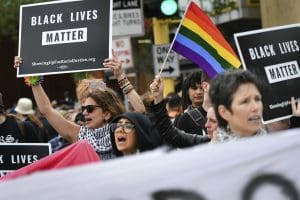LGBTQ groups use Pride Month to denounce police brutality against black community
‘We have a responsibility to address systemic inequities as well as listen and support the brown and black community,’ Indianapolis Pride event organizers said.

LGBTQ Pride groups across the country are denouncing or cutting ties with local police departments in the wake of George Floyd’s killing and the protests it sparked against police brutality.
Some LGBTQ Pride groups say they are reconsidering their relationships with police departments entirely for future Pride Month events.
Many Pride events have already been canceled due to the pandemic and virtual events are taking their place.
Indy Pride announced on Thursday it was taking steps to reduce the police presence at its Pride events. Like many others, the group canceled its in-person celebrations due to concerns about COVID-19, but said that future events will not contract with police departments for security.
The group said it would contract with a security firm instead.
Indianapolis mandates that police be used to assist with traffic issues at events, meaning officers will still be present to assist in that capacity.
“We have a responsibility to address systemic inequities as well as listen and support the brown and black community. The Indy Pride Virtual Festival will uplift black and brown people in our community, spotlight their stories, and showcase their contributions to our community,” Indy Pride stated.
On Wednesday, Capital Pride Alliance, which is in charge of Pride Month events in Washington, D.C., released a statement in solidarity with the Black Lives Matter movement as well.
“Pride this year comes on the heels of a global pandemic and a nation confronting the murder of George Floyd at the hands of Minneapolis police officers,” Capital Pride Alliance president Ashley Smith said. “…This horrific tragedy, and the murders of Breonna Taylor, Tony McDade, and Ahmaud Arbery by police and white vigilantes, have created a nationwide uprising crying out for racial justice and the protection of Black life.”
Ryan Bos, executive director of Capital Pride Alliance, stated that the group was “committed to assessing our relationship with the Metropolitan Police Department” and “making certain that our partners are working for the betterment of the entire community.”
In San Francisco, Pride officials are hosting a roundtable on attacks against black transgender people that includes members of LGBTQ advocacy groups.
And on Tuesday, Rhode Island Pride issued a statement saying it “condemns the violent murder” of Floyd, a black man who died after a white police officer in Minneapolis knelt on his neck for nearly 10 minutes, killing him.
“Rhode Island Pride acknowledges that for centuries, people of color in America have been abused, assaulted, and murdered by law enforcement,” the group wrote. “Rhode Island Pride acknowledges that more often than not, police are defenders of property rather than protectors of minority rights and safety.”
The group has canceled its Pride flag events this year “in solidarity with George Floyd’s family and the Black Lives Matter Movement,” according to the Providence Journal.
Despite renewed interest on Pride groups’ ties to police departments across the country and leaders’ statements in solidarity with the ongoing protests, LGBTQ organizers of color have been fighting law enforcement involvement in Pride events for years.
In 2017, activists from the LGBTQ collective No Justice No Pride created a blockade to protest the Capital Pride Parade, which caused delays during the event. One of the collective’s demands was to stop uniformed police officers from being included in the event.
It is still calling for those measures this year.
Last year, Sacramento Pride parade organizers announced they were banning uniformed officers from Pride events. Earlier this year, seven San Francisco Pride members similarly moved to ban Alameda County Sheriff’s Office from marching in the San Francisco parade after it forced black mothers out of their housing in January by breaking through the door with a battering ram and sending in an armored vehicle.
San Francisco Pride’s executive director later said it would implement no such ban because only a few members supported the idea.
The Los Angeles Pride Parade meanwhile is re-envisioning its event this year, which has been canceled to prevent the spread of COVID-19, as a solidarity march against police violence. Leaders were scrutinized earlier this month after it was discovered they were working with police for the event, and had encouraged “a strong and unified partnership with law enforcement.”
In a statement on Thursday, LA Pride leaders said they had heard the criticism and were “committed to educating ourselves on how to be an ally in the fight against systemic social injustice and police brutality and to work for justice reform.”
“We are here to listen and learn,” they wrote, promising further information on the event in the following days.
Published with permission of The American Independent Foundation.
Recommended

SC governor to sign bill banning hormone therapy for transgender youth into law
Treatments for youth already taking the drugs could be gradually taken off them through Jan. 31
By Skylar Laird, South Carolina Daily Gazette - May 09, 2024
Alaska House committee advances, expands proposal to bar trans girls from girls sports
Amended bill would add elementary, middle school and collegiate sports to limits in place for high school
By Claire Stremple, Alaska Beacon - April 16, 2024
Bills targeting trans people are on the rise nationwide and in Alaska — most focus on children
House committee advances legislation that would restrict the rights of Alaska trans kids
By Claire Stremple, Alaska Beacon - April 01, 2024












































































